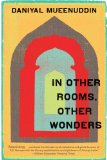Summary | Excerpt | Reading Guide | Reviews | Beyond the Book | Readalikes | Genres & Themes | Author Bio

As he read the salaam, Rafik had breathed, “Va leikum as-salaam.”
She had signed the letter, written by a neighbor, with an X.
“Look,” said Rafik, “she wept on the paper.”
“Or watered it. What will you do?”
“I’ll have to go.”
She turned her face to the wall and held herself rigid when he touched her.
“Have I done you some wrong?”
“No,” she said, “I’ve done you wrong.”
“My wife is sixty years old, little girl. She and I have been together for almost fifty. She stood by me, she bore me two sons, she kept my house, my honor has always been perfectly safe in her hands.”
“Honor.” Saleema began to cry. “That’s bad. You’re tiring of me and this situation. Imagine how it feels for me.”
He tried to reassure her, but she could tell that the letter had shaken him, as a man of principle. The baby and her love had made him gentler and more philosophical, taking a long view of life as he began to grow old—but the same gentleness would bend him toward his duty, which always would be to his wife and grown sons. He would punish himself and thus her for not loving his wife and for loving Saleema so much and so carnally.
She made him give her a phone number before he left, of a shop near his house, and every evening she wanted to use it, the paper burned in her pocket; but she never dared, what would she say, who would she say was calling? When he returned to Lahore he had changed. He had told his wife about little Allah Baksh.
A few days later, Rafik’s son and his wife came to stay in the Lahore house. Saleema was dusting the living room and happened to see them arrive, through a window looking out onto the drive in front. She heard the harsh puttering of a rickshaw, and then an old woman emerged, led by a young man with glistening hair and a strong manner. She knew immediately who this must be, her destruction come in this feeble guise. Panic overcame her, mixed with jealousy and a strange pride that came of knowing they had traveled with her in their minds, planning against her. She watched as they walked up the drive and through the passage to the servants’ area. Suddenly remembering her son, who was with Rafik, she raced through the house to the back. But she arrived too late, the old woman had come to the quarters and found Rafik playing with the baby. Saleema walked past the open door, pretending to be on some errand, expecting to hear shouting and tears. The old woman sitting on the bed looked up at Saleema with rheumy eyes that expressed neither reproach nor disliking but simply a flat dismissal. She knew who this young girl must be.
Rafik brought the child to Saleema’s quarters, where she had retreated.
“At least this one belongs to me,” she whispered.
The grown son, when he met Saleema later that afternoon in the servants’ sitting area, said to her, “Salaam, Auntie.”
I’m younger than you, you country fool, she thought spitefully. She would much rather have been attacked, for then she could react.
That night she sat in the kitchen till midnight, the sleeping baby in her arms, watching the cockroaches scurry across the dirty floor. Finally going to her own room, she roughly pushed her husband over on the bed. He had become so thin that his face looked like a broken steel lantern, a gash of mouth and skin stretched over wires.
“Don’t smoke,” she ordered. “And don’t touch me, stay against the wall.”
“I lost all that long ago.” He knew why she had come back to his bed.
Lying and staring at the ceiling, nursing the baby when it woke, she felt her love for Rafik tearing at her breast, making her a stranger to herself, breaking her. Now she slept again next to this man who disgusted her, while her love must be sleeping beside his ancient wife, who had known him in his youth, who knew all about him. How she loved the baby, its tiny feet and hands, its contented smacking noises and warmth beside her.
Excerpted from In Other Rooms, Other Wonders by Daniyal Mueenuddin. © 2009 by Daniyal Mueenuddin. Excerpted by permission of W.W.Norton & Company. All rights reserved. No part of this excerpt may be reproduced or reprinted without permission in writing from the publisher.
Your guide toexceptional books
BookBrowse seeks out and recommends the best in contemporary fiction and nonfiction—books that not only engage and entertain but also deepen our understanding of ourselves and the world around us.